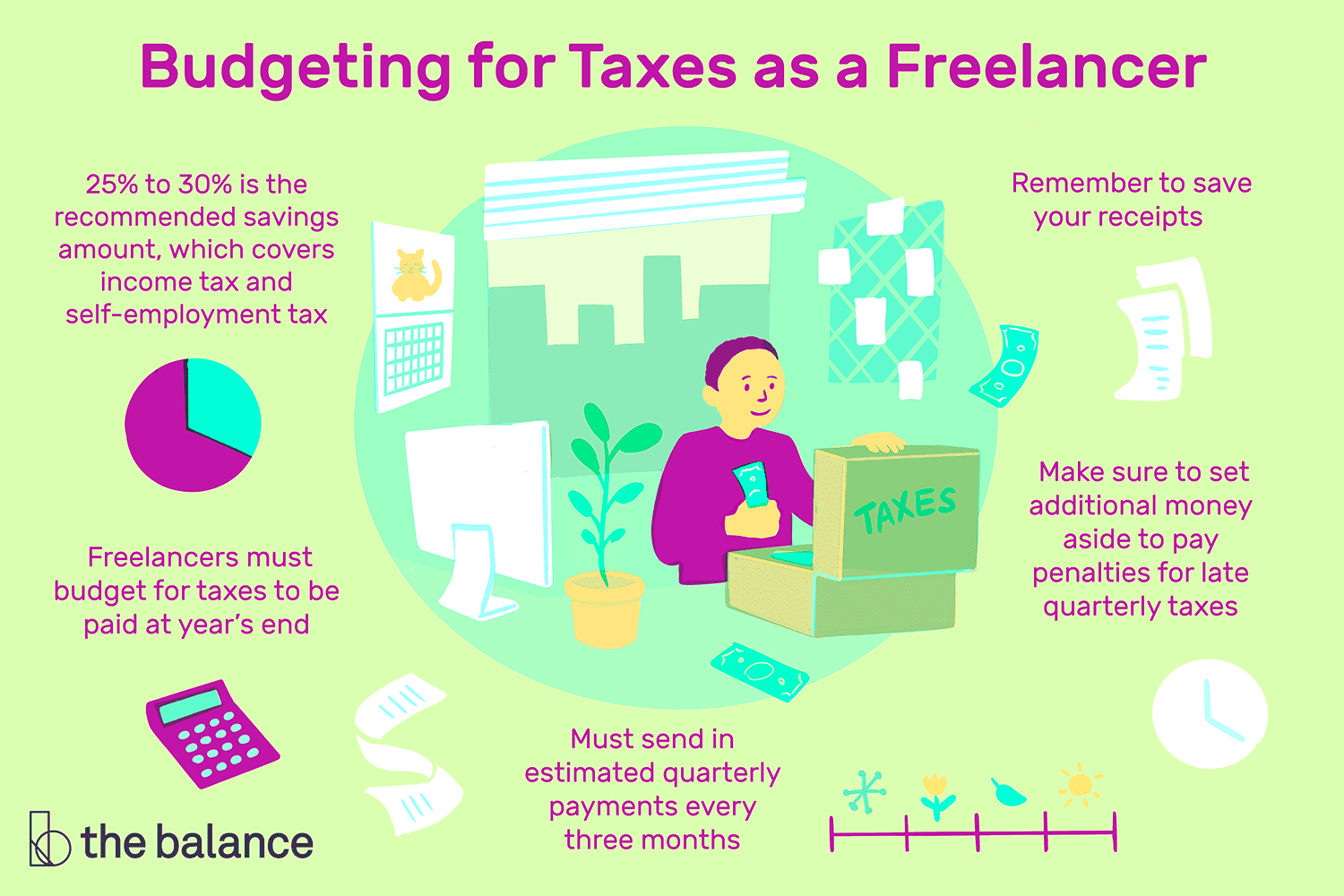As a freelancer, understanding how taxes work is crucial to managing your finances. Unlike traditional employees, freelancers are responsible for handling their own tax payments. This means there’s no automatic withholding of taxes from your income. It can be a little confusing at first, but once you get the basics down, you’ll be able to stay on top of your finances. In this section, we’ll break down the essential tax concepts that every freelancer should know.
Freelancers are usually considered self-employed, which means they are responsible for paying both income tax and self-employment tax. The self-employment tax covers Social Security and Medicare taxes that are typically withheld by an employer. This is something to keep in mind when estimating how much to set aside from your earnings.
Some freelancers also have to deal with state and local taxes, which vary depending on where you live and work. Understanding your tax obligations will help you avoid surprises at the end of the year.
Why Taxes Matter for Freelancers

Taxes matter for freelancers because they ensure you remain compliant with the law and avoid costly penalties. Freelancers are often tempted to avoid setting aside money for taxes, but this can lead to serious financial problems down the road. If you don’t pay taxes as required, the IRS can impose fines, interest, and even legal action. Here's why taxes are important for freelancers:
- Prevent legal issues: Not paying taxes can lead to audits and penalties.
- Ensure eligibility for benefits: Paying into Social Security and Medicare ensures access to benefits in the future.
- Avoid financial stress: Regularly saving for taxes helps you avoid a huge tax bill at the end of the year.
Additionally, paying taxes keeps your business running smoothly, as many clients may require proof that you are in good standing with the IRS. Being diligent with your taxes helps build credibility and trust as a freelancer.
Also Read This: The Benefits of Being a Level 1 Seller on Fiverr
How to Calculate Your Taxable Income

Calculating your taxable income as a freelancer can be tricky, but with the right approach, it becomes more manageable. Essentially, your taxable income is your total income minus any deductions that reduce the amount of income you have to pay taxes on. Let’s break this down step-by-step:
- Track all income: Keep a record of all your freelance income, including payments from clients. This can be done with tools like invoicing software or spreadsheets.
- Account for business expenses: Freelancers can deduct expenses related to their business, such as office supplies, software, and even a portion of their home rent if they have a home office.
- Calculate self-employment tax: On top of your regular income tax, you must also calculate your self-employment tax. The self-employment tax rate is 15.3%, covering Social Security and Medicare.
Here's an example calculation:
| Income | Amount |
|---|---|
| Total Income | $50,000 |
| Business Expenses | -$10,000 |
| Taxable Income | $40,000 |
In this case, your taxable income would be $40,000 after deducting $10,000 in business expenses. From this amount, you’ll pay both income tax and self-employment tax.
Remember to save all receipts and documentation related to your business expenses, as you’ll need them when filing your taxes. The more you can deduct, the less taxable income you’ll have, which can reduce your overall tax bill.
Also Read This: How to Write an Ad in Fiverr for Buyer Requests
What Percentage of Income Should You Save for Taxes?

As a freelancer, one of the biggest questions is how much money to set aside for taxes. Since there’s no employer to automatically withhold taxes, you need to plan ahead and save a percentage of your income. This can be tricky, but estimating the right amount will help you avoid financial stress at tax time.
Generally, freelancers should aim to save between 25% to 30% of their income for taxes. This percentage accounts for both income tax and self-employment tax (which includes Social Security and Medicare taxes). However, the exact percentage can vary based on factors like:
- Your income bracket: The more you earn, the higher the tax rate.
- Your location: State and local taxes may affect the amount you need to save.
- Business deductions: The more you can deduct, the less you may need to save.
If you’re just starting out as a freelancer, it’s a good idea to save around 30% of your income. As you gain more experience and understand your business expenses, you might be able to adjust this percentage. For example, if you have significant business expenses, you may be able to save less, but always be cautious and conservative.
To make saving easier, consider setting up a separate bank account for taxes. This way, you can transfer a percentage of each payment you receive directly into that account to ensure you don’t accidentally spend the money you need for taxes.
Also Read This: How to Edit Your Fiverr Username: A Step-by-Step Guide
Common Tax Deductions for Freelancers
One of the benefits of freelancing is that you can deduct certain business expenses from your taxable income, which can lower your overall tax bill. Knowing what qualifies as a deduction is key to maximizing your savings. Here are some common tax deductions for freelancers:
- Home Office: If you have a dedicated workspace in your home, you can deduct a portion of your rent or mortgage, utilities, and internet.
- Supplies and Equipment: Items you use for your freelance work, such as computers, printers, and office supplies, are deductible.
- Software and Subscriptions: Business-related software (like accounting tools or design programs) and subscription services (like website hosting) can be deducted.
- Travel and Meals: If you travel for work or attend business meetings, you can deduct travel costs, including airfare, accommodations, and meals.
- Health Insurance: Freelancers who pay for their own health insurance can often deduct the cost of premiums from their taxable income.
Remember, deductions must be business-related. You can’t deduct personal expenses, so it’s important to separate your business and personal finances. Keep detailed records and receipts to support your claims in case of an audit.
Also Read This: How to Block a Seller on Fiverr
How to Estimate Quarterly Tax Payments
Freelancers are typically required to make estimated tax payments quarterly. This can be confusing, but breaking it down into steps can help you stay on track and avoid underpayment penalties. The IRS requires freelancers to pay estimated taxes if they expect to owe at least $1,000 in tax for the year. Here's how you can estimate and pay quarterly taxes:
1. Estimate your total income: Add up all your expected freelance income for the year. Be as accurate as possible.
2. Subtract business expenses: Deduct any business-related expenses to determine your taxable income.
3. Calculate your tax liability: Use the IRS tax tables or an online calculator to determine how much you owe based on your taxable income.
4. Calculate self-employment tax: In addition to income tax, you’ll need to calculate the self-employment tax, which is 15.3% on your net income.
5. Divide your total liability by four: Once you have your total tax liability (including both income tax and self-employment tax), divide this number by four to get the amount you should pay each quarter.
Here’s an example:
| Step | Amount |
|---|---|
| Total Income | $50,000 |
| Business Expenses | -$10,000 |
| Taxable Income | $40,000 |
| Estimated Tax Liability (25%) | $10,000 |
| Self-Employment Tax (15.3%) | $6,120 |
| Total Liability | $16,120 |
| Quarterly Payment | $4,030 |
In this case, your total quarterly tax payment would be $4,030. It’s important to make these payments on time to avoid penalties, so mark your calendar for each due date: April 15, June 15, September 15, and January 15 of the following year.
If you’re unsure about how to estimate your taxes, using tax software or consulting with a tax professional can help simplify the process.
Also Read This: Incorporating Freelance Experience on Your Resume
Hiring an Accountant or Doing It Yourself
As a freelancer, one of the big decisions you’ll need to make is whether to handle your taxes yourself or hire an accountant. Both options have their benefits, but the choice depends on your business needs, your understanding of taxes, and how much time you’re willing to invest in managing your finances. In this section, we’ll look at both options so you can make an informed decision.
Doing it Yourself – If you have a basic understanding of taxes and enjoy staying on top of your finances, doing it yourself might be a good option. Using tax software or online tools can make it easier to file your taxes and estimate quarterly payments. You’ll also save money by not paying for professional services.
- Pros:
- Cost-effective.
- Complete control over your finances.
- Ability to learn more about tax laws and deductions.
- Cons:
- Can be time-consuming and complex.
- Risk of making mistakes or missing out on deductions.
- Can lead to stress, especially at tax time.
Hiring an Accountant – If you’re willing to spend the money, hiring an accountant can save you time and reduce stress. An accountant can help you maximize deductions, ensure your taxes are filed accurately, and offer advice on managing your finances. This is especially helpful if you have a complicated tax situation.
- Pros:
- Expert advice and support.
- Less time spent on tax preparation.
- Can help with long-term tax planning.
- Cons:
- Cost of hiring an accountant.
- Potential communication delays if you’re not organized with your records.
Ultimately, the choice depends on your comfort level with taxes, your budget, and how much you value your time. Some freelancers even choose to do their own taxes during the early stages of their business and hire an accountant as their business grows.
Also Read This: How Much Do Fiverr Freelancers Make?
FAQs
Freelancers often have many questions about taxes. Here are some of the most common questions to help you navigate your tax responsibilities:
- Do I need to file taxes if I didn’t earn much? – Yes, freelancers must file taxes if their income exceeds the IRS minimum threshold. Even if you didn’t earn a lot, you still have to report your income.
- Can I deduct expenses for a home office? – Yes, if you have a dedicated space in your home for work, you can deduct a portion of your rent or mortgage, utilities, and other related costs.
- What is the self-employment tax? – The self-employment tax is a 15.3% tax that covers Social Security and Medicare for freelancers. It’s separate from income tax and must be paid on your net earnings.
- How can I avoid paying too much in taxes? – Keep track of all your business expenses, make estimated quarterly payments, and take advantage of deductions like the home office deduction and business-related travel expenses.
- Can I hire an accountant if I’m just starting out? – Yes, even if you're a new freelancer, hiring an accountant can help you avoid costly mistakes and provide valuable financial guidance as you start your freelance journey.
Conclusion
Taxes can be a complex part of freelancing, but understanding how they work is essential for managing your finances and staying on the right side of the law. Whether you choose to handle taxes yourself or hire an accountant, it’s important to keep accurate records, save a portion of your income for taxes, and take advantage of available deductions. By planning ahead and staying organized, you’ll be able to reduce the stress that comes with taxes and ensure your freelancing business remains financially healthy.
Remember, no matter which path you choose, keeping track of your earnings and expenses is key to staying on top of your tax obligations. If you're ever unsure, it’s always a good idea to consult a tax professional to help guide you through the process.




